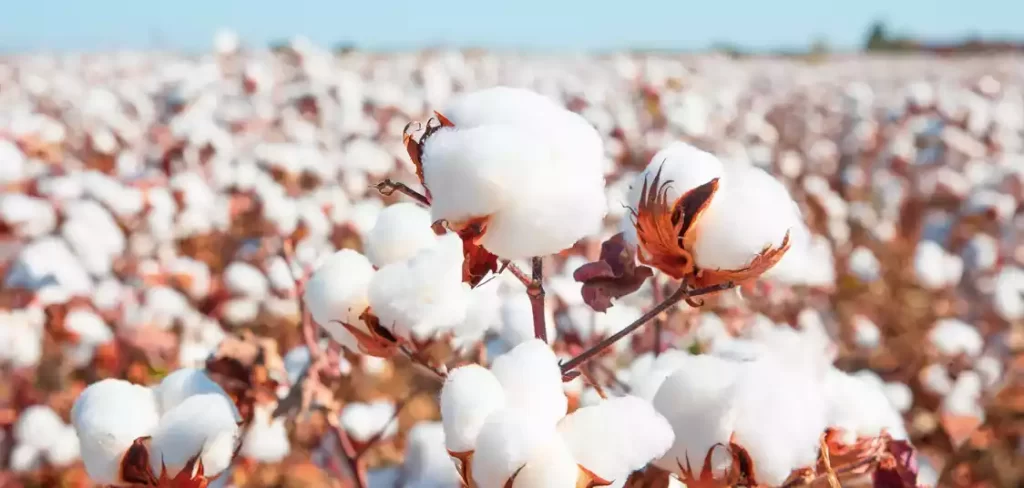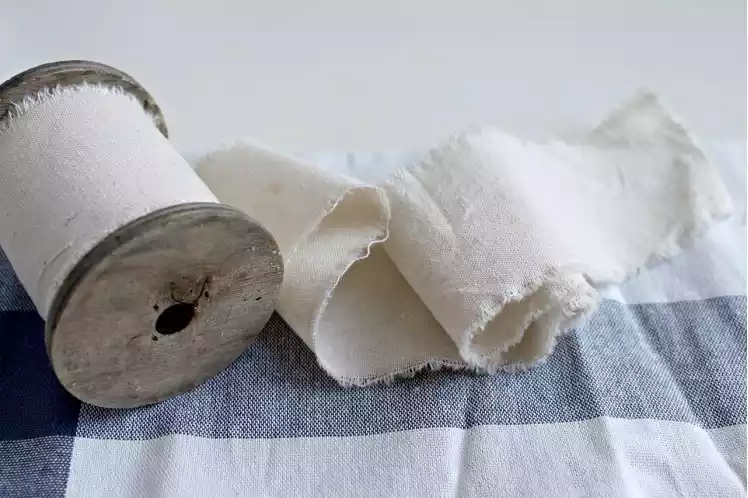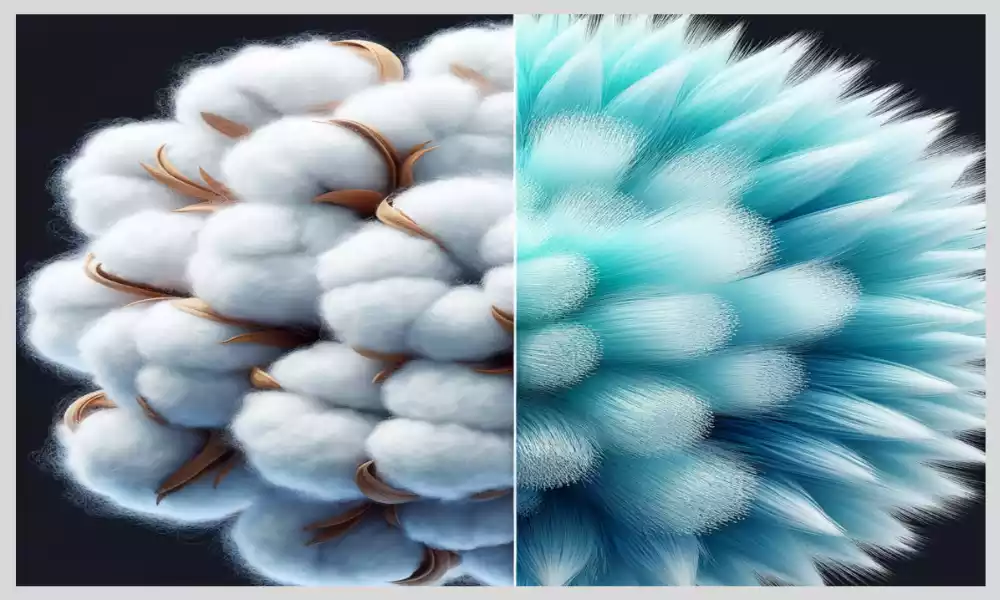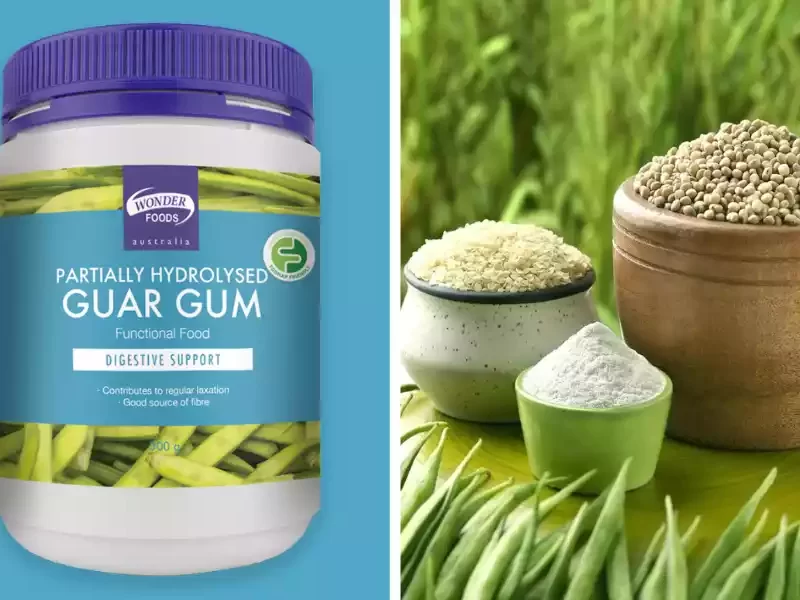It is a natural fiber that is derived from cotton-growing plants. It is well-known for its breathability, softness, and absorbent properties, making it a comfortable material to wear and perfect for casual clothes and sleepwear. It is susceptible to wrinkles and is less robust than polyester.
Polyester On the other hand is a synthetic fiber created by chemical processes. It’s not as breathable as cotton, but it is also very durable and moisture-wicking as it is resistant to stretching and shrinking. Its glossy appearance and wrinkle-resistant characteristics make it a preferred option for activewear and sportswear.
Although cotton is biodegradable and environmentally friendly, polyester is not biodegradable and is derived from petroleum-based materials and poses environmental issues. The decision between cotton and polyester is contingent on factors such as durability, comfort maintenance, and the impact on the environment.
Fabric Cotton
The natural fiber of cotton is made from the soft seeds that are produced by the cotton plant (Gossypium). It has a prominent place in the world of textiles due to its extraordinary characteristics. Cotton is famous for its breathability, softness, and extraordinary absorption.

It is a product with a long background, with hundreds of decades of cultivating and usage in textile production around the world. Cotton’s fibers are extremely absorbent, which makes it extremely pleasant in hot weather since it efficiently removes sweat from your body.
With its natural matte appearance and anti-allergenic qualities, the cotton fabric is a top choice for a broad range of clothes, including clothes, shirts, and bedding. Its versatility and ease of use make cotton an indispensable material for everyday wear and household textiles that are an eternal and integral element in our daily lives.
Polyester Fabrics
Polyester can be described as a synthetic polymer that can be used as a fiber that is widely used within the industry of textiles. It is created through chemical processes that involve the polymerization of ester-based monomers.

They are usually produced from petroleum-based substances. Polyester fibers possess distinct features that make them popular in a variety of applications. One of the most notable characteristics of polyester’s strength as it is extremely resistant to shrinking, stretching, and wrinkles, which makes it the preferred material for products that require long-lasting performance like sportswear and outdoor equipment.
Polyester is also more breathable than natural fibers such as cotton, but it compensates for this by its ability to wick moisture which makes it suitable for use in activewear. Its silky texture gives it an attractive appearance, which contributes to its usage in garments and fabrics where a shiny look is sought.
Although polyester has many benefits it isn’t biodegradable and is derived by burning fossil fuels causing environmental issues. There are efforts underway to develop eco-friendly forms of polyester, including recycled or bio-based polyester to reduce the environmental impact. Polyester is a flexible synthetic fiber that has a variety of applications, notably in the outdoor and fashion industries.
Difference Between Cotton and Polyester
Here’s a comparison chart summarizing the key differences between cotton and polyester:
| Aspect | Cotton | Polyester |
|---|---|---|
| Source | Natural fiber from plants | Synthetic fiber from petroleum-based products |
| Softness and Comfort | Soft and comfortable against the skin | May not be as soft or comfortable |
| Breathability | Highly breathable, suitable for hot weather | Less breathable, can be uncomfortable in heat |
| Absorbency | Excellent moisture-wicking absorbs sweat | Efficient moisture-wicking properties |
| Wrinkle Resistance | Prone to wrinkles, requires ironing | Wrinkle-resistant, maintains a smoother appearance |
| Durability | Less durable, prone to wear and tear | Highly durable, resistant to stretching and shrinking |
| Quick Drying | Slower to dry, retains moisture | Dries quickly, suitable for activewear |
| Biodegradability | Biodegradable, breaks down naturally | Non-biodegradable, can contribute to pollution |
| Environmental Impact | Water-intensive cultivation and pesticide use | Petroleum-based, energy-intensive production, microplastic pollution |
| Allergies and Sensitivities | Hypoallergenic, suitable for sensitive skin | May cause skin irritation in some individuals |
| Cost | Generally more affordable | Competitive pricing, easily accessible |
Maintenance and Care
The maintenance and care of Polyester and cotton fabrics differ due to their distinctive characteristic. Being a natural fiber requires care to avoid shrinkage and wrinkles. To take care of cotton clothing it is suggested to wash them with cold warm water using mild detergent.
Drying should be performed with low heat or a fan to prevent excessive shrinkage, and ironing is often required at a medium-to-high setting to eliminate wrinkles. Storage of cotton items in a dry, cool location is vital to avoid the growth of mildew or discoloration.
Polyester, due to its resistance to wrinkles and durability it is relatively low maintenance. Polyester clothes can be washed by machine in warm or cold water using a gentle cycle along with mild laundry detergent. It is quick-drying, and making use of a low-temperature setting is suggested to avoid shrinkage or damage.
The majority of polyester items do not require ironing due to their wrinkle-resistant properties. Storage in a dry and cool space can help prevent moisture accumulation and odor problems. Understanding the need for maintaining polyester and cotton fabrics is essential for their long-term durability and to maintain their beauty and comfort.
Environmental Impact of Cotton and Polyester
Cotton:
- Water Usage: Cotton farming in the traditional way is renowned for its excessive consumption of water. It could take a lot of liters of water to make a single cotton fabric and contribute to water shortages in certain areas.
- Chemicals, pesticides: Cotton farming typically involves using pesticides as well as chemical fertilizers. These could harm ecosystems in the local area and cause adverse health effects on workers in the agriculture industry.
- Land Use: Cotton cultivation requires large amounts of land, which could lead to deforestation and habitat loss in certain cases.
- Biodegradability: The natural fiber of cotton that is biodegradable. This means that it can be broken down naturally in the natural environment without creating long-term pollution.
Polyester:
- Petroleum-based: Polyester is derived from petroleum-based materials that are fossil fuels. The production of polyester is a contributor to the use of limited resources.
- Energy intensive: The manufacturing process of polyester requires the use of a lot of energy, which releases greenhouse gases, and is a contributor to the climate crisis.
- Microplastic Pollution: Polyester disperses tiny plastic particles, known as microplastics after washing, which can be absorbed into waterways and cause harm to aquatic life. These microplastics may remain in the water for a considerable period.
- Non-biodegradable polyester: is not biodegradable that is, it doesn’t disintegrate naturally, leading to environmental pollution over time when it is disposed from landfills.
Pros and cons of cotton
Pros of Cotton:
- The softness of the fabric and its comfort: Cotton is renowned for its softness and natural feel and comfort, which makes it a good choice to wear with skin. It is usually favored to wear casual clothes and bedding.
- The ability to breathe: The fabric of cotton is extremely breathable, allowing air to circulate. This helps to keep your person cool and comfy during hot weather.
- Absorption: It is a great fabric with properties for wicking moisture, which help in removing sweat and body moisture and making it perfect for towel and workout clothes.
- Hypoallergenic: The fabric is more likely not to trigger irritations to the skin or cause allergies which makes it an ideal option for people who have sensitive skin.
- Biodegradable: It is an organic fiber that is biodegradable so it is an environmentally green option.
Cons of Cotton:
- Wrinkles: Cotton fabric tends to wrinkle easily, and requires more attention and ironing to keep a smooth look.
- Shrinking: Cotton garments can shrink when exposed to heat, resulting in an issue with fit after washing.
- More Durable: Cotton is generally less durable than synthetic fibers, such as polyester. It could get worn out faster after frequent washing and use.
- Water Retention: Although cotton is abrasive, however, it also holds moisture and takes more time to dry. This could cause inconvenience for certain types of applications.
- Environmental impact: Traditional cotton cultivation can be a major drain on resources, requiring large amounts of water and pesticides and could cause environmental issues if it is not produced sustainably.
Pros and cons of Polyester
Pros of Polyester:
- The durability: Polyester is incredibly robust and resists shrinking and stretching. It can withstand washing and wear, which makes it ideal for clothing that lasts for a long time. products.
- The resistance to wrinkles: Polyester is less likely to get wrinkles and retains an appearance that is smoother than natural fibers, such as cotton.
- Moisture-Wicking: Polyester has properties that help to wick moisture away which means it can effectively draw moisture away from your body, which makes it ideal for activewear and sportswear.
- Rapid Drying: The polyester fabric dries quicker than other natural fibers, which makes it ideal for athletic and outdoor clothing.
- Colorfastness: Polyester fabrics can keep their color for a long time even after repeated washings or exposure to the sun.
Cons of Polyester:
-
- More Breathable: Polyester is less breathable than natural fibers such as cotton, leading to discomfort when it is hot and humid climates.
- Not as soft: It may not provide a similar softness and comfy feeling as natural fibers, which could make it less appealing for specific clothes products.
- Environmental impact: It is made from petroleum materials, which makes it unbiodegradable, and causes environmental problems. There are however efforts being made to create environmentally friendly versions of polyester.
- Possible skin irritation: Some individuals may suffer from skin irritations or allergic reactions while wearing polyester, specifically if the fabric does not have a ventilation liner.
- Static Electricity Polyester fabric is susceptible to the buildup of static electricity and can cause discomfort or uninviting in certain conditions.
What is the preferred choice for designing clothing: polyester or cotton?
If people are looking to design clothing, they must choose between cotton or polyester. The choice is based on the style they would like their clothes to look similar to. Polyester is great due to its strength and does not get wrinkled easily. It’s typically employed for sports clothing or items that must look polished and shiny. It’s durable and lasts for a long time.
Cotton is great since it’s gentle and comfortable to wear. It’s great for clothes that you wear every day such as pajamas and T-shirts. It is also great for those who suffer from allergies since it’s unlikely to irritate the skin. So, the decision between cotton and polyester will depend on the kind of clothing people want to wear and how they would like their clothes to feel and look.
Ending
Each Cotton and Polyester both have qualities and drawbacks which makes them suited for various uses. The comfort and breathability of cotton make it ideal for clothes and bedding, whereas Polyester’s durability and affordability make it an ideal option for many different scenarios.
In deciding between them aspects like the environmental impact, comfort, and particular use scenarios must be taken into consideration.



